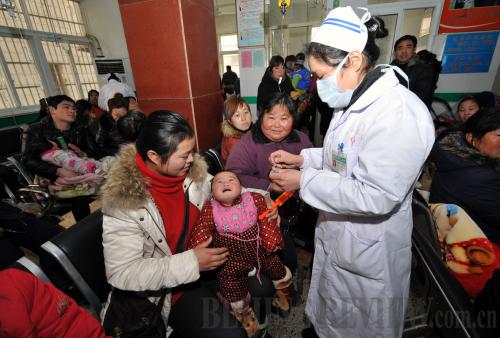|
 |
|
A LARGER SAFETY NET: A sick baby receives an injection in a county clinic in Bengbu City of central China's Anhui Province. China vows to give 90 percent of its population medical insurance coverage by the end of 2011 (HE JUNCHANG) |
The government's budget this year will top an unprecedented 10 trillion yuan ($1.52 trillion), an increase of 11.9 percent over that of 2010, according to the government's annual budget report delivered to the Fourth Session of the 11th National People's Congress on March 5.
The country's total fiscal revenue will hit 8.972 trillion yuan ($1.363 trillion), up 8 percent year on year. The budget deficit is expected to reach 900 billion yuan ($137 billion), accounting for around 2 percent of GDP, down from last year's 2.5 percent.
Two thirds of the central budget will be spent on improving the people's livelihoods this year, said Minister of Finance Xie Xuren at a press conference on March 7. Additionally, 70-75 percent of local budgets will go toward these efforts.
The financial budget on people's livelihoods, Xie said, will mainly go to two major areas: those directly related to education, medical service, social security, housing, employment and culture; and those involving infrastructure, with a large part appropriated to agriculture being directed to increasing farmers' incomes.
For an ordinary Beijing resident like Zhang Hongyu, the new central budget might bring new changes to his life. Living in a half century-old apartment without a private toilet or a private kitchen, Zhang looks forward to better living conditions. As a low-income resident, skyrocketing housing prices have put his desire to buy a home out of reach. The recent central budget increase in affordable houses has given him renewed hope.
"I believe I will have a better life," said Zhang.
For a migrant worker from Shanxi Province in Beijing, the budget expenditure in education may give Wang Weiguo's nine-year-old son equal access to education in the Chinese capital.
Being a non-registered Beijing resident, Wang used to pay extra fees for his son's education in Beijing. In addition, his son would face other unfair treatments in taking exams to junior and senior middle schools.
"The new central budget said the government will make efforts to provide compulsory education to migrant workers' kids in cities. I hope my son can enjoy the same treatment as Beijing children," said Wang.
As the central budget is used to improve people's living conditions this year, six major tasks need to be accomplished, Xie said.
First, the Central Government will increase investment in education. A guarantee mechanism for compulsory education funding in rural areas will be completed and the benchmark quota per student for public spending in rural middle and primary schools will be increased. The government will continue its efforts in implementing exemptions from tuition and textbook expenses for urban students during their nine-year compulsory education, providing compulsory education for the children of migrant workers in cities, and renovating dilapidated rural schools. The system of aiding poor students in public high schools, universities, and higher and secondary vocational schools will be improved. Boarders from financially strained families that are currently attending middle and primary schools will be given living subsidies.
Second, the government will greatly support reforms to the medicare system, with the aim of increasing the medicare coverage rate to 90 percent of the country's total population by the end of 2011. It will raise the level of subsidies for urban residents participating in the basic health insurance program and for farmers covered by the rural cooperative medical insurance scheme to 200 yuan ($30.36) per person, from 120 yuan ($18.29) per person. The subsidy for basic public health services for urban and rural residents will be raised to 25 yuan ($3.81) per person this year from last year's 15 yuan ($2.29) per person.
Third, investment in affordable houses for low-income residents will be significantly increased to fulfill the plan of building and renovating 10 million affordable apartments in urban areas and renovating dilapidated houses for 1.5 million rural households.
| 